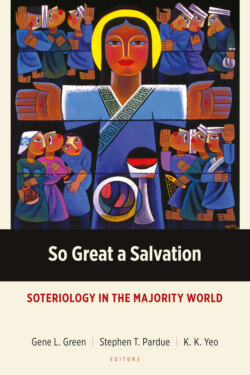Читать книгу So Great a Salvation - Группа авторов - Страница 8
На сайте Литреса книга снята с продажи.
Soteriology of the Global Church in the Majority World
ОглавлениеHow should we understand soteriology in our pluralistic world, especially in the Majority World in which pre- or extra-biblical knowledge of God abounds in the context of religious diversity? I find it interesting that not even one contributor to this volume addresses this crucial issue. For if Christ is sui generis, would Cyprian’s dictum—extra ecclesiam nulla salus (outside the church there is no salvation)—still hold true today?[12]
Traditionally, three views have emerged from the debate over this question:
1. All religions lead to God and to the salvation of all people (universalism, pluralism, e.g., Origen, Irenaeus, Ernst Troeltsch, John Hick; or annihilationism, the belief all nonbelievers will be destroyed after death).
2. Salvation is universally available through Christ, who is predestined to do so (inclusivism, e.g., Justin Martyr’s “Logos among Greeks and Socrates,” Clement of Alexandria’s “philosophy brought salvation to the Greeks as the Laws did to the Hebrews,” Thomas Aquinas’s “baptism of desire,” Karl Barth’s “election of Christ”).
3. Salvation is available only in Christ (exclusivism, restrictivism, or particularism: R. Douglas Geivett, W. Gary Phillips).[13]
From the discussion above, we know that the traditional debate regarding Acts 4:12 (“there is no salvation through any else except Jesus; for there is no other name under heaven given among human beings by which we must be saved”), especially in the Majority World, remains challenging. Among the qualified inclusivistic views is that of Lesslie Newbigin and Alister McGrath, who argue for the assurance of salvation in Christ but acknowledge that they themselves are agnostic regarding those who have not heard of the gospel. Thus, they believe in the prevenient grace of God at work through the Spirit. Alistair McGrath writes: “I have stressed that there is a specifically Christian understanding of salvation, which is grounded uniquely in the life, death, and resurrection of Jesus Christ. To affirm that there is a distinctively Christian understanding of salvation is not to deny that other faiths offer salvation in their own terms.”[14]
Maybe Majority World scholars are not shying away from the “whether there is salvation outside the church” question, but responding by living out the breadth of biblical salvation (see “The Biblical Semantic of ‘God Saves’ [‘Jesus’ in Hebrew]” section above), being both true and critical of their Sitz im Leben (life situation). Thus, besides the intellectual rigors of the presenters at the Evangelical Theological Society (ETS) (November 19, 2015) and the Institute of Biblical Research (IBR) (November 20, 2015) “Scripture and Theology in Global Context” sessions, I am most touched by their personal stories. Ray Aldred shared how the European settlers conquered his land and destroyed his identity, and thus how “God as liberator” to the European settlers was “God the conqueror” for Native Americans. Elaine Goh recounts what a burden it is for Asian Chinese to fear being losers, and thus what a gospel of salvific hope the book of Ecclesiastes has become to them. Emily Choge Kerama tells the story of being born with a congenital defect in a Kenyan family and how her Christian parents witnessed to the power of God despite all odds.
While Western scholarship is often either prejudiced by cultural blind spots or prideful in its assumption of its own “normative” culture-less theology, many Majority World scholars educated in the West are tempted to mimic their mentors and make a contextual-global hermeneutic an afterthought, or worse, to resist the project this series promotes. The chapters in this volume are by no means perfect, but the contributors are seeking to live out their faith dynamically, faithful to the Scriptures and critical of their cultural assumptions. Similar to the rich young ruler in Luke 18, who thought practicing the law meant keeping the commandments (vv. 20–21), our presenters aim to complement one another on that “still one thing lacking” (v. 22) in each of our lives. “Still one thing lacking” has something to do with us “entering the kingdom of God” (v. 17) or “inheriting eternal life” (v. 18) by living out the spirit of the law. Contextually, it is selling his possessions and helping the poor for the rich ruler; it may suggest other requirements depending on context—such as embracing one’s cultural identity (for the First Nations of Canada) or continuing to yearn for reconciliation between North and South (for the South Korean)—the strengthening of one’s character as one participates in the suffering of Christ.
Thus, soteriology is a self-theologizing and existential act that is well served by the deep imbrication of theology, Scripture, and readers’ contexts. The indicative and imperative moods of salvation must be held in tension. This tension calls believers into not simply abstract imputed righteousness. This tension calls all to real participation in, and a sharing in the merit of, Christ’s righteousness (Matt. 5:20; Rom. 2:5–13; Phil. 2:12–13), thus affirming the primacy of grace and the necessity of works, similar to “faith without works is dead” in James (2:17) and “obedience of faith” in Romans (1:5; 16:26).
